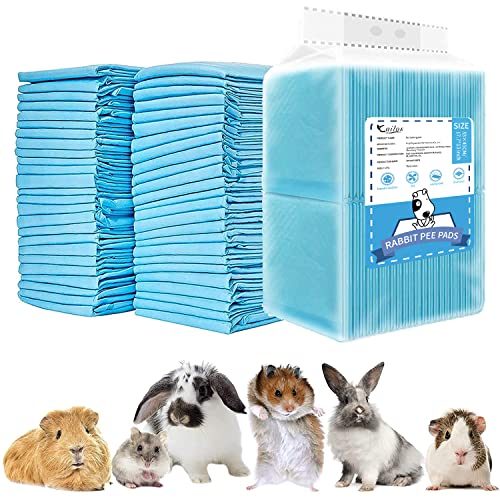Not sure if anyone is able to help me with this. My lop (4 year old spayed female) is sick -- she's always had some sort of respiratory condition, but every time we have taken her to the vet for a checkup, they decide that she's fine. We've asked if we can have a prescription to keep a nebulizer on hand when she has trouble breathing. We've taken videos and pictures and documented her breathing issues -- nothing.
Anyways, today she started sneezing more than usual and when I gave her and her bondmate their pellets, I noticed she suddenly stopped eating. I went over and it seemed like her mouth was stuck shut. I got my husband to help me look at her and at first, we thought she had gotten into something sticky. We couldn't find anything sticky though and as she sneezed again and more snot came out, we realized it was dried snot.
I tried to clean it off her face with a damp towel, but realized I would need something more. I googled it, and apparently people have had success with warm water and a bit of dawn dish soap. I tried that and we were able to get her mouth unstuck and she ate the piece of strawberry that we'd tried to feed her earlier then. Then she started blowing snot bubbles out of her nose. I read that people have used baby nose syringes to get the snot out....we didn't have that, but I found an ear syringe bulb, cleaned it off, and we started suctioning her.
We got a lot of it out and she was starting to breathe more easily, but it seemed like some might be dried higher up. So we brought down a pot of water and a single cooktop thing (it's a plug-in induction stovetop) and heated the water to a steam. She actually really seemed to like that and she was breathing more easily and fell asleep.
So I started cleaning up her area to make sure I could get rid of as much dust as possible and replaced all of their hay with fresh hay. I tried to get her to eat some leaves and drink some water, but she only nibbled on a bit before going into her tunnel to hide.
While all of this was going on, my husband called the emergency vet that had been recommended to us by her usual vet. They asked if she was vaccinated...the last I'd heard, the vaccine was not available in my state (PA), but I guess it is starting to become available since the rabbit virus has spread here, too. Either way, our vet did not have the vaccine. She has no contact with the outside at all and has no bleeding at all -- just the snot and sneezing. We told them this, but they still wouldn't take her.
We're going to try calling our vet in the morning, but because we live in a rural area, this vet travels between a few locations and so it might be difficult to get a hold of her. We'll try to get someone else if not.
Anyone have any suggestions for making her more comfortable? I don't know what to do -- she was the runt of the litter, much smaller than the other bunnies, and she's always been a bit more frail than our other two bunnies. I don't know if I should just let her sleep or continue to try to get her to eat/drink. When she's near the steam from the pot, she seems to breathe/sleep more easily. When I wake her up is when she starts sniffling and sneezing, so I'm wondering if I should just let her sleep for now?
I was thinking maybe something like bendaryl might help her symptoms? I googled it and it seems like people have safely given it to their rabbit. But I couldn't find a reliable source for dosing. She's only about 3 lbs.
Anyways, today she started sneezing more than usual and when I gave her and her bondmate their pellets, I noticed she suddenly stopped eating. I went over and it seemed like her mouth was stuck shut. I got my husband to help me look at her and at first, we thought she had gotten into something sticky. We couldn't find anything sticky though and as she sneezed again and more snot came out, we realized it was dried snot.
I tried to clean it off her face with a damp towel, but realized I would need something more. I googled it, and apparently people have had success with warm water and a bit of dawn dish soap. I tried that and we were able to get her mouth unstuck and she ate the piece of strawberry that we'd tried to feed her earlier then. Then she started blowing snot bubbles out of her nose. I read that people have used baby nose syringes to get the snot out....we didn't have that, but I found an ear syringe bulb, cleaned it off, and we started suctioning her.
We got a lot of it out and she was starting to breathe more easily, but it seemed like some might be dried higher up. So we brought down a pot of water and a single cooktop thing (it's a plug-in induction stovetop) and heated the water to a steam. She actually really seemed to like that and she was breathing more easily and fell asleep.
So I started cleaning up her area to make sure I could get rid of as much dust as possible and replaced all of their hay with fresh hay. I tried to get her to eat some leaves and drink some water, but she only nibbled on a bit before going into her tunnel to hide.
While all of this was going on, my husband called the emergency vet that had been recommended to us by her usual vet. They asked if she was vaccinated...the last I'd heard, the vaccine was not available in my state (PA), but I guess it is starting to become available since the rabbit virus has spread here, too. Either way, our vet did not have the vaccine. She has no contact with the outside at all and has no bleeding at all -- just the snot and sneezing. We told them this, but they still wouldn't take her.
We're going to try calling our vet in the morning, but because we live in a rural area, this vet travels between a few locations and so it might be difficult to get a hold of her. We'll try to get someone else if not.
Anyone have any suggestions for making her more comfortable? I don't know what to do -- she was the runt of the litter, much smaller than the other bunnies, and she's always been a bit more frail than our other two bunnies. I don't know if I should just let her sleep or continue to try to get her to eat/drink. When she's near the steam from the pot, she seems to breathe/sleep more easily. When I wake her up is when she starts sniffling and sneezing, so I'm wondering if I should just let her sleep for now?
I was thinking maybe something like bendaryl might help her symptoms? I googled it and it seems like people have safely given it to their rabbit. But I couldn't find a reliable source for dosing. She's only about 3 lbs.





































































